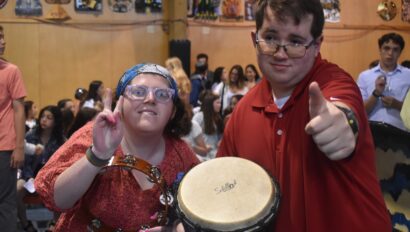by Yael Bendat-Appell, Staff Trainer and Camper Intake Coordinator
One of the most beneficial aspects of sending kids and teenagers to overnight summer camp is the opportunity to disconnect and unplug from the world at large. The absence of phone, TV, internet and social media allows our youth to focus primarily on developing friendships, physical and artistic skills and their intellectual muscles. This countercultural “bubble” that camp creates is a cherished part of the camp experience. However, while working at Camp Ramah in Wisconsin as a staff trainer, I did a lot of thinking about the role that camp should play in either protecting its campers from the harsh news of current events that do occur, or informing them about these events. From this summer’s devastating deadly shootings in Baton Rouge, Minnesota and Dallas, to the Gaza war of the summer of 2014 and other incidents of terror — the question arises again and again: Do we, as camp staff, have an educational imperative to inform our campers about the news, even if it means bursting this precious bubble?
camp is the opportunity to disconnect and unplug from the world at large. The absence of phone, TV, internet and social media allows our youth to focus primarily on developing friendships, physical and artistic skills and their intellectual muscles. This countercultural “bubble” that camp creates is a cherished part of the camp experience. However, while working at Camp Ramah in Wisconsin as a staff trainer, I did a lot of thinking about the role that camp should play in either protecting its campers from the harsh news of current events that do occur, or informing them about these events. From this summer’s devastating deadly shootings in Baton Rouge, Minnesota and Dallas, to the Gaza war of the summer of 2014 and other incidents of terror — the question arises again and again: Do we, as camp staff, have an educational imperative to inform our campers about the news, even if it means bursting this precious bubble?
Educating our children is a precarious endeavor. And while the bubble of camp is an important and enviable tool for child development, the bubble is not the goal in and of itself. Jewish summer camp has the opportunity to help children reflect on who they want to be as citizens of this world once they emerge from their summer respite. In addition to providing them with an environment for reflection, we must also provide them with the tools for how to act as citizens of the world. Discussing the events occurring in the outside world, in a thoughtful, supportive and developmentally appropriate way, is the first step in building the kind of citizens that we hope the next generation will become. The island in time and space that is summer camp must have bridges that connect it to reality if we want its magical and transformative effects to endure.
This post originally appeared on The Wexner Foundation blog.




